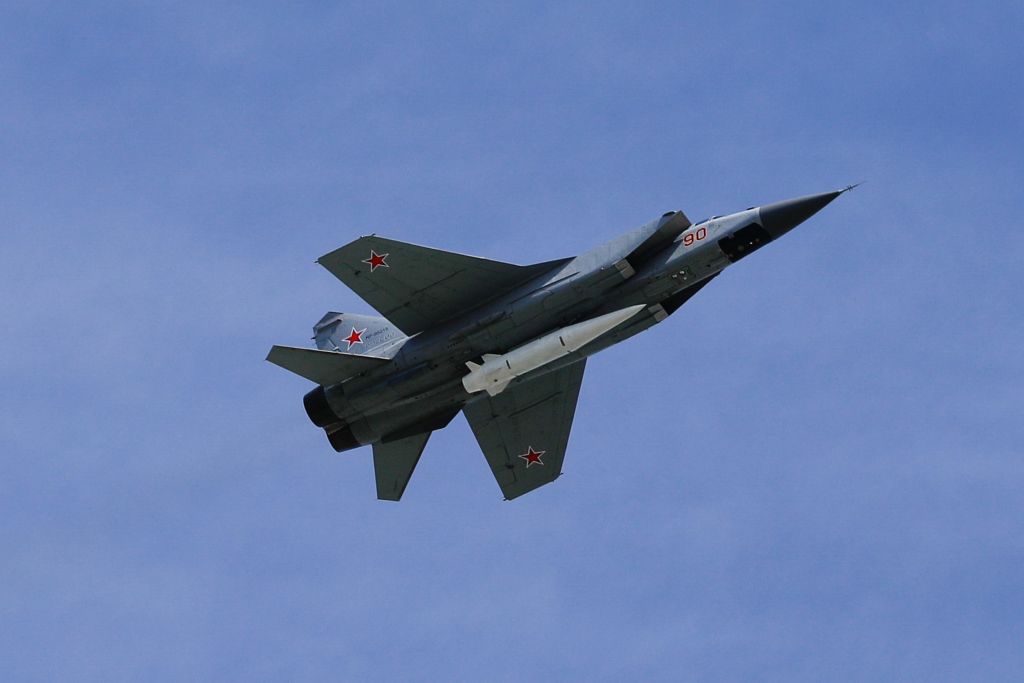Russia uses hypersonic missiles in Ukraine


A free daily email with the biggest news stories of the day – and the best features from TheWeek.com
You are now subscribed
Your newsletter sign-up was successful
Russian forces used hypersonic missiles, which can travel at 10 times the speed of sound, in western Ukraine on Friday, NBC News reported.
"The Kinzhal aviation missile system with hypersonic aeroballistic missiles destroyed a large underground warehouse containing missiles and aviation ammunition in the village of Deliatyn in the Ivano-Frankivsk region," the Russian Defense Ministry announced Saturday.
Russian President Vladimir Putin unveiled the Kinzhal ("Dagger") missiles in 2018, but this is the first time Russian forces have admitted to using them in combat, according to The Moscow Times.
The Week
Escape your echo chamber. Get the facts behind the news, plus analysis from multiple perspectives.

Sign up for The Week's Free Newsletters
From our morning news briefing to a weekly Good News Newsletter, get the best of The Week delivered directly to your inbox.
From our morning news briefing to a weekly Good News Newsletter, get the best of The Week delivered directly to your inbox.
Michael Puttré, writing for Discourse, explained that hypersonic missiles "are more maneuverable and harder to detect than earlier high-speed weapons, such as intercontinental ballistic missiles, or ICBMs, and can travel at more than five times the speed of sound."
Russia and China have already added hypersonic missiles to their arsenals, while the United States and several other countries are working to develop them.
"[A] hypersonic weapon with a high-Mach speed and a great ability to maneuver would defeat any U.S. anti-missile system that depends on tracking inbound missiles flying on a predictable course," Puttré argued. Others, however, expressed skepticism as to whether hypersonic weapons were really so revolutionary.
Ryan Cooper wrote for The Week that "while a hypersonic missile would be nearly impossible to shoot down, that is already true of ICBMs," that "a realistic massed attack of multiple-warhead [ICBMs] would be impossible to defend against," and that even in the event of a successful hypersonic nuclear attack, the U.S. would retain second strike capability in the form of its nuclear-armed submarines.
A free daily email with the biggest news stories of the day – and the best features from TheWeek.com
Cooper argued that fear about hypersonic missiles is being whipped up solely because "the military-industrial complex needs a new bogeyman to justify the preposterously bloated and wasteful Pentagon budget."
Grayson Quay was the weekend editor at TheWeek.com. His writing has also been published in National Review, the Pittsburgh Post-Gazette, Modern Age, The American Conservative, The Spectator World, and other outlets. Grayson earned his M.A. from Georgetown University in 2019.
-
 Why is the Trump administration talking about ‘Western civilization’?
Why is the Trump administration talking about ‘Western civilization’?Talking Points Rubio says Europe, US bonded by religion and ancestry
-
 Quentin Deranque: a student’s death energizes the French far right
Quentin Deranque: a student’s death energizes the French far rightIN THE SPOTLIGHT Reactions to the violent killing of an ultraconservative activist offer a glimpse at the culture wars roiling France ahead of next year’s elections
-
 Secured vs. unsecured loans: how do they differ and which is better?
Secured vs. unsecured loans: how do they differ and which is better?the explainer They are distinguished by the level of risk and the inclusion of collateral
-
 What is ‘Arctic Sentry’ and will it deter Russia and China?
What is ‘Arctic Sentry’ and will it deter Russia and China?Today’s Big Question Nato considers joint operation and intelligence sharing in Arctic region, in face of Trump’s threats to seize Greenland for ‘protection’
-
 What would a UK deployment to Ukraine look like?
What would a UK deployment to Ukraine look like?Today's Big Question Security agreement commits British and French forces in event of ceasefire
-
 Would Europe defend Greenland from US aggression?
Would Europe defend Greenland from US aggression?Today’s Big Question ‘Mildness’ of EU pushback against Trump provocation ‘illustrates the bind Europe finds itself in’
-
 Did Trump just end the US-Europe alliance?
Did Trump just end the US-Europe alliance?Today's Big Question New US national security policy drops ‘grenade’ on Europe and should serve as ‘the mother of all wake-up calls’
-
 Is conscription the answer to Europe’s security woes?
Is conscription the answer to Europe’s security woes?Today's Big Question How best to boost troop numbers to deal with Russian threat is ‘prompting fierce and soul-searching debates’
-
 Trump peace deal: an offer Zelenskyy can’t refuse?
Trump peace deal: an offer Zelenskyy can’t refuse?Today’s Big Question ‘Unpalatable’ US plan may strengthen embattled Ukrainian president at home
-
 Vladimir Putin’s ‘nuclear tsunami’ missile
Vladimir Putin’s ‘nuclear tsunami’ missileThe Explainer Russian president has boasted that there is no way to intercept the new weapon
-
 The Baltic ‘bog belt’ plan to protect Europe from Russia
The Baltic ‘bog belt’ plan to protect Europe from RussiaUnder the Radar Reviving lost wetland on Nato’s eastern flank would fuse ‘two European priorities that increasingly compete for attention and funding: defence and climate’
